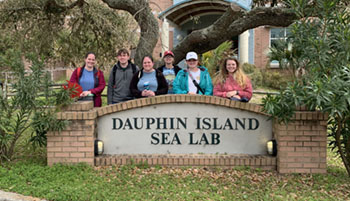The Biology Program at Athens State University strives to provide meaningful experiential learning opportunities through undergraduate research projects, internships, and travel courses.
Research Opportunities
Current Undergraduate, post-bachelorette, and pre-college students may obtain course credit or volunteer for independent research projects with faculty at Athens State. Individual research projects give students the opportunity to participate in the process of science and provide valuable experience for graduate or professional school. We have research opportunities for those interested in wet lab research, field research, or computer modeling. Bioinformatics based research can be completed via distance learning technologies. In addition, students can receive course credit approval for research projects conducted in labs at other institutions. Contact Dr. Sara Cline (sara.cline@athens.edu) or Dr. Shannon Pittman (shannon.pittman@athens.edu) for more information.
Wet Lab Research
Research opportunities in the wet lab at Athens State range from genetics to molecular biology. Students will have the opportunity to learn real-world lab skills, including pipetting, sterile technique, electrophoresis, molecular cloning, notebook maintenance, grant writing, and research presentation skills.
Field Research
Athens State offers opportunities for students to become involved in field environmental research. Students may participate in projects such as biodiversity surveys, animal and plant population dynamics, animal behavior, and habitat assessment. Students will learn skills such as experimental design, analysis of biological data, simulation modeling, wildlife management, grant writing, scientific presentation skills, and scientific publishing.
Bioinformatics Research
Athens State participates in the Characterizing Our DNA Exceptions (CODE) project, coordinated by HudsonAlpha and the Genomics Education Partnership (GEP), coordinated by the University of Alabama. These two programs use publicly available data to investigate variations in genetic material, including 3D simulations of human protein variants, potential drug discovery, and the impact of forces driving genomic rearrangements.
Experiential Courses
The Biology Program integrates experiential learning opportunities into regular coursework. The courses listed here offer particularly immersive learning experiences: https://www.athens.edu/resources/qep/student-projects/
Travel Courses
Several Biology courses have a travel component that allows students to experience the ecology, natural history, and biodiversity of a new ecosystem. Currently, students can explore montane plant ecology in the Great Smoky Mountains National Park or marine life at Dauphin Island Sea Lab. Study abroad programs are also offered every summer.

Athens State University is a member of the Marine Environmental Sciences Consortium, based at Dauphin Island, Alabama. This affiliation offers Athens State University students an opportunity to take courses and conduct research in estuarine and marine environments. Courses offered during the summer at Dauphin Island Sea Lab may be taken for credit at Athens State University toward a major or minor in Biology or a minor in Marine Science.
ATHENS ARCHIVES SCIENCE SPOTLIGHT

Allene Jeanes came to Athens College in 1930 as a lead science teacher, directly out of her Master’s program at the University of California. Known for her research on carbohydrates, Dr. Jeanes isolated a dextrose-producing bacteria that allowed for the mass production of dextran, used as a blood plasma extender by physicians in the Korean and Vietnam Wars.
Later, in the 1950s, she participated in the research team that developed xanthan gum, which acts as an emulsifier to keep foods such as oil and vinegar from separating. Dr. Jeanes was the first woman awarded the Distinguished Service Award from the U.S. Department of Agriculture, and her name is today listed in the National Inventors Hall of Fame.
